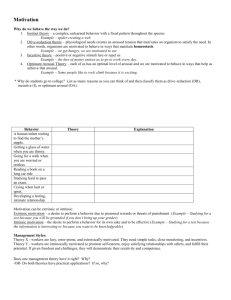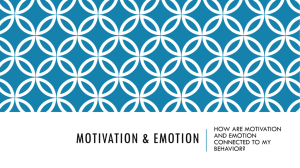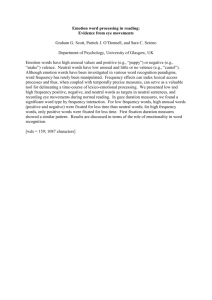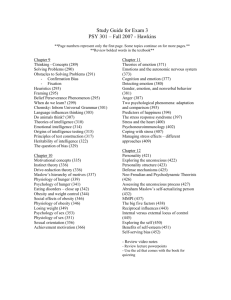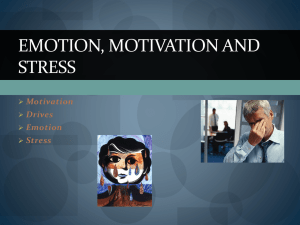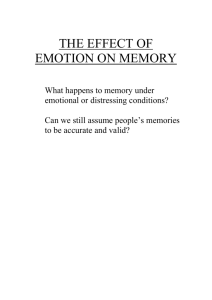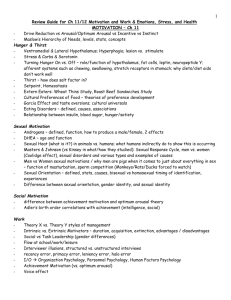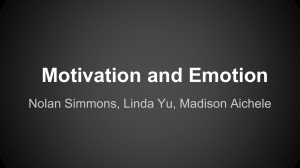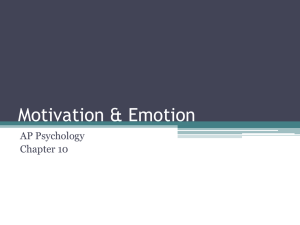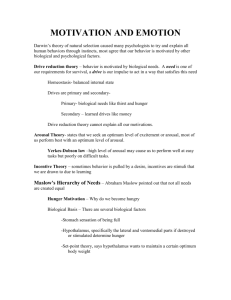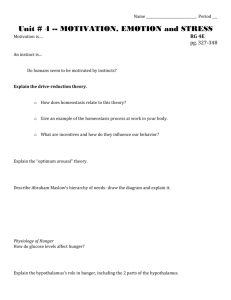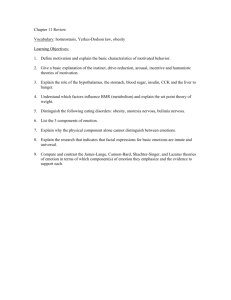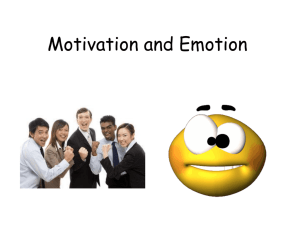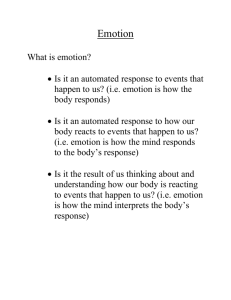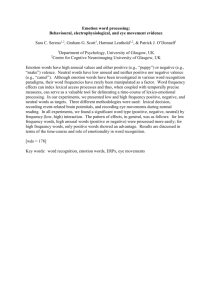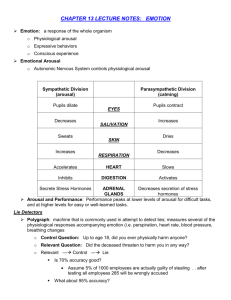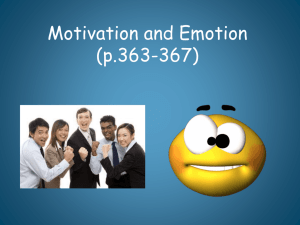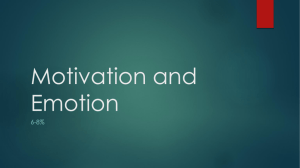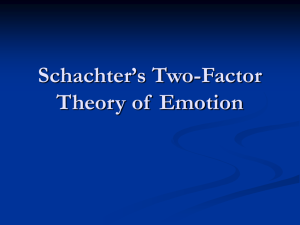Unit 8 - MOTIVATION AND EMOTION
advertisement
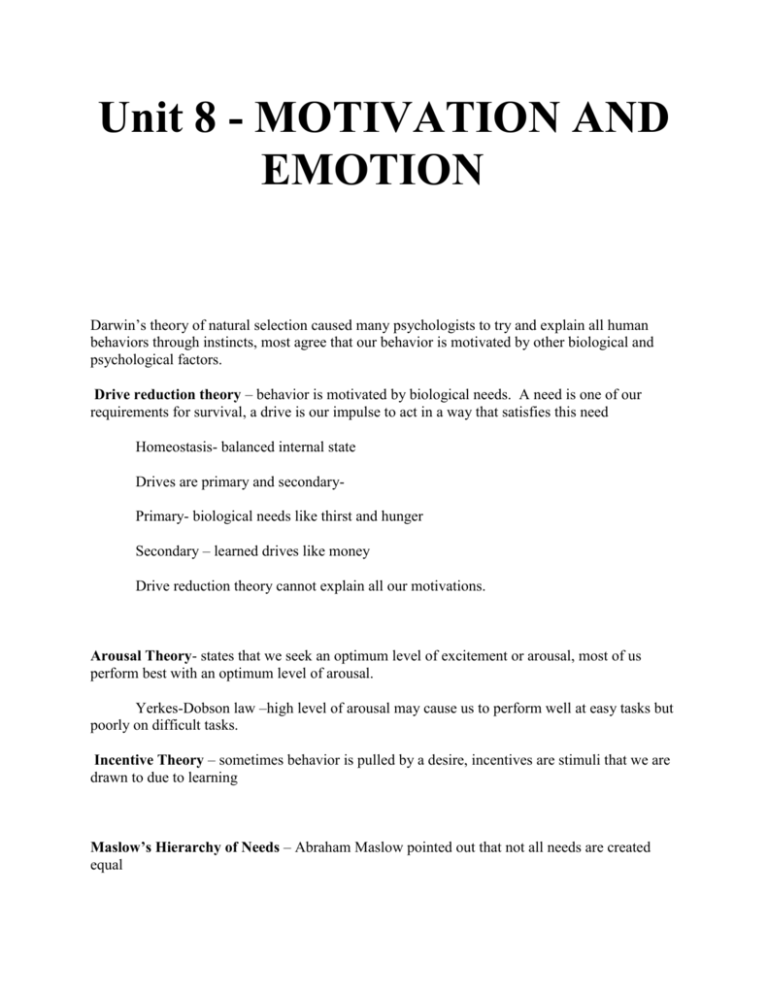
Unit 8 - MOTIVATION AND EMOTION Darwin’s theory of natural selection caused many psychologists to try and explain all human behaviors through instincts, most agree that our behavior is motivated by other biological and psychological factors. Drive reduction theory – behavior is motivated by biological needs. A need is one of our requirements for survival, a drive is our impulse to act in a way that satisfies this need Homeostasis- balanced internal state Drives are primary and secondaryPrimary- biological needs like thirst and hunger Secondary – learned drives like money Drive reduction theory cannot explain all our motivations. Arousal Theory- states that we seek an optimum level of excitement or arousal, most of us perform best with an optimum level of arousal. Yerkes-Dobson law –high level of arousal may cause us to perform well at easy tasks but poorly on difficult tasks. Incentive Theory – sometimes behavior is pulled by a desire, incentives are stimuli that we are drawn to due to learning Maslow’s Hierarchy of Needs – Abraham Maslow pointed out that not all needs are created equal Hunger Motivation – Why do we become hungry Biological Basis – There are several biological factors - Stomach sensation of being full - Hypothalamus, specifically the lateral and ventomedial parts if destroyed or stimulated determine hunger - Set-point theory, says hypothalamus wants to maintain a certain optimum body weight Psychological factors - external cues, attractiveness or availability of food Garcia effect, learned taste aversions Culture and background Eating Disorders – different cultures have drastically different rates of eating disorders, rates are highest in the U.S. The three most common are: Bulimia – Bulimics eat large amounts of food in a short period of time and then get rid of the food by vomiting, excessive exercise, or the use of laxatives. (Binge then Purge) Bulimics are obsessed with food and their weight, the majority of bulimics are women Anorexia Nervosa - Anorexics starve themselves to below 85 percent of their normal body weight and refuse to eat due to their obsession with weight, the vast majority are women Obesity – People with diagnosed obesity are severely overweight, often over 100 pounds, and the excess weight threatens their health. Obese people typically have unhealthy eating habits rather than the food obsessions of the other two disorders. Some people may also be genetically predisposed to obesity Social Motivation – Achievement Motivation – Humans seem to be motivated to figure out our world and master skills, sometimes regardless of the benefits of the skills or knowledge. Studies involve looking at differences in how people set and meet personal goals and go about acquiring new knowledge or skills. Extrinsic/Intrinsic MotivationExtrinsic motivators are rewards that we get for accomplishments from outside ourselves Ex. Grades, salary, etc. Intrinsic motivators are rewards we get internally, such as enjoyment or satisfaction Knowing what type of motivation an individual responds best to can give managers insight into what strategies will be most effective. Extrinsic motivators are effective for a short period of time but studies show that if we want a behavior to continue, intrinsic motivation is most effective. Management Theory – studies of management styles show two basic attitudes that affect how managers do their jobs: with Theory X – managers believe that employees will work only if rewarded benefits or threatened with punishment good Theory Y – managers believe that employees are internally motivated to do work and policies should encourage this internal motive. THEORIES ABOUT EMOTION – James-Lange – They theorized that we feel emotion because of biological changes, physiological change causes emotion Cannon-Bard – They doubted this order, they demonstrated that similar physiological changes correspond with drastically different emotional states. Biological change and the cognitive awareness of the emotional state occur simultaneously Two Factor Theory – Stanley Schacter explains emotional experiences in a more complete way than either previous. He pointed out that both our physical responses and our cognitive labels combine to cause any particular emotional response. Emotion depends on the interaction between two factors, biology and cognition. STRESS – stress and emotion are intimately connected concepts. The term stress can refer to either certain life events (stressors) or how we react to these changes in the environment (stress reactions) Measuring stress – Thomas Holmes and Richard Rahe designed one of the first instruments to measure stress. Their social readjustment rating scale (SRRS) measured stress using life-change units (LCUs). Any major life change increases the score on the SRRS, a person who scored very high on the SRRS is more likely to have stress-related diseases than a person with a low score. General Adaptation Syndrome (GAS) – Hans Seyle describes the general response in humans and animals to stressful events. There are three stages: Alarm reaction – Heart rate increases, blood is diverted away from other body functions to muscles needed to react. The organism readies itself to meet the challenge through activation of the sympathetic nervous system. Resistance – The body remains physiologically ready. Hormones are released to maintain this state of readiness. If the resistance stage lasts too long, te body can deplete its resources. Exhaustion – The parasympathetic nervous system returns our physiological state to normal. We can be more vulnerable to disease in this stage especially if our resources were depleted by an extended resistance stage. Various studies show that a perceived lack of control over events exacerbates the harmful effects of stress, control over events tends to lessen stress.
